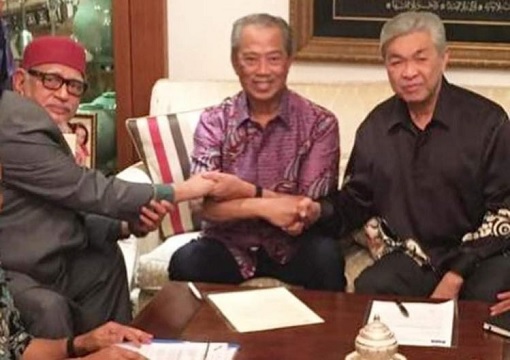 By Emmanuel Samarathisa
By Emmanuel Samarathisa
HOW much do you really know about the latest so-called stimulus package? The government wants to pump in RM25 bil of what is a programme that is as large as RM250 bil in order to keep the economy (and us) going.
While much of its accounting manoeuvres such as a moratorium on loans to provide short-term cash flow relief, theoretically at least provided people spend and not hoard cash, the real amount, RM25 bil, is still worth scrutinising.
The question is how is Prime Minister Tan Sri Muhyiddin Yassin to get that amount? Back of the envelope calculations show that he would at least be spending about RM21 bil on operating expenditure and RM4 bil on development expenditure.
Former minister Tan Sri Wahid Omar had said over the weekend that embarking on such a programme would widen the fiscal deficit up to 6.2%, increasing the risk of a rating downgrade.
“With this additional RM25 bil, the fiscal deficit will rise to RM99 bil or 6.2% of gross domestic product,” he said in a March 29 statement. “I am made to understand that several measures have been undertaken to increase revenue and reduce operating costs so that the fiscal deficit can be reduced to just RM74 bil or 4.6% of GDP.” Wahid did not flesh out what those measures were.
However, based on Wahid’s calculations, it is safe to say that obtaining that RM25 bil is going to challenge the government’s self-imposed debt level of 55% of GDP.
That presents a challenge to Muhyiddin. He could raise the money and get the Finance Ministry to change the regulation so that the self-imposed debt level can be adjusted. But he still needs to table a supplementary supply bill as he is ultimately requesting for more money.
Regardless of how he does this, whether it’s redirecting funds from other ministries and their respective agencies or raiding the coffers of national oil company Petroliam Nasional Bhd (Petronas), Muhyiddin needs to table a supply bill. That is according to Article 101 of the Federal Constitution.
He can spend first and table later. That has been the norm. But he can’t escape the fact that Parliament will come a-calling and he has to answer that. Yes, I believe they’ll figure some kind of teleconferencing since Covid-19 is still a problem.
That said, there is a workaround. Muhyiddin can opt for a private financing initiative (PFI) where he can raise money off-balance sheet and carry on with his stimulus. A PFI is on the table since it also removes the problem of parliamentary politics since he has to deal with an opposition that might prove more annoying than helpful. From his point of view, at least.
And the system is already in place. There is Pembinaan PFI Sdn Bhd, a special purpose vehicle created in 2006 to solely raise money and nothing else, as well as a trust account to hold funds collected.
Pembinaan PFI had been making negative headlines for basically borrowing billions from the Employees Provident Fund and Kumpulan Wang Persaraan Diperbadankan (KWAP) for opaque projects not captured in the government’s balance sheet.
This is done by masking loan repayments for debt as “rental payments” from the Ministry of Finance (MoF) to Pembinaan PFI, through a lease-sublease arrangement involving government land.
So, repayments are classified as operating expenditure in the government’s accounts, rather than debt servicing.
But problems surfaced due to a lack of effective oversight. In the third series of the 2013 Auditor-General’s Report, Pembinaan PFI was found to have exhausted 92.8% or RM18.56 bil of the first RM20 bil raised on 547 projects as at Dec 31, 2013. However, the auditor-general found that 60% of these projects had budget overruns while another 40% spent less than half their allocated budget.
As for the RM10 bil raised from EPF-KWAP, the auditor-general found in the same report that while some RM7.57 bil were spent on 313 projects, 68% had spent less than half their budget while 27% saw cost overruns. Another 5% did not touch their budget entirely.
And, until today, we have no clue what these development projects were, save for sporadic mentions in the auditor-general’s report. For instance, the first series of the 2016 Auditor-General’s Report identified an RM81.3 mil contract to build the Malaysian Arts School in Kuching as a Pembinaan PFI-financed project.
To be sure, it is still early to tell whether Muhyiddin will opt for a PFI. But let’s be clear: the issue here is not about increasing the debt level, which can be done by the stroke of a pen from the Minister of Finance. It is about ensuring that during these tough times, the right programmes reach the right people, the small and medium enterprises.
A PFI obscures that motive. In fact, if Muhyiddin embarks on PFI to fund portions of the stimulus, risks of more public funds being wasted or handed out to the politically connected will surface. And, when that happens, no one will be able to track or monitor these things until we have another round of revelations by the auditor-general.
So the best way to work around this is the hard way — call for an emergency parliamentary sitting, table the supplementary bill and be willing to be scrutinised not only by opposition MPs but the general public. No matter how politically risky that may be. — March 30, 2020









